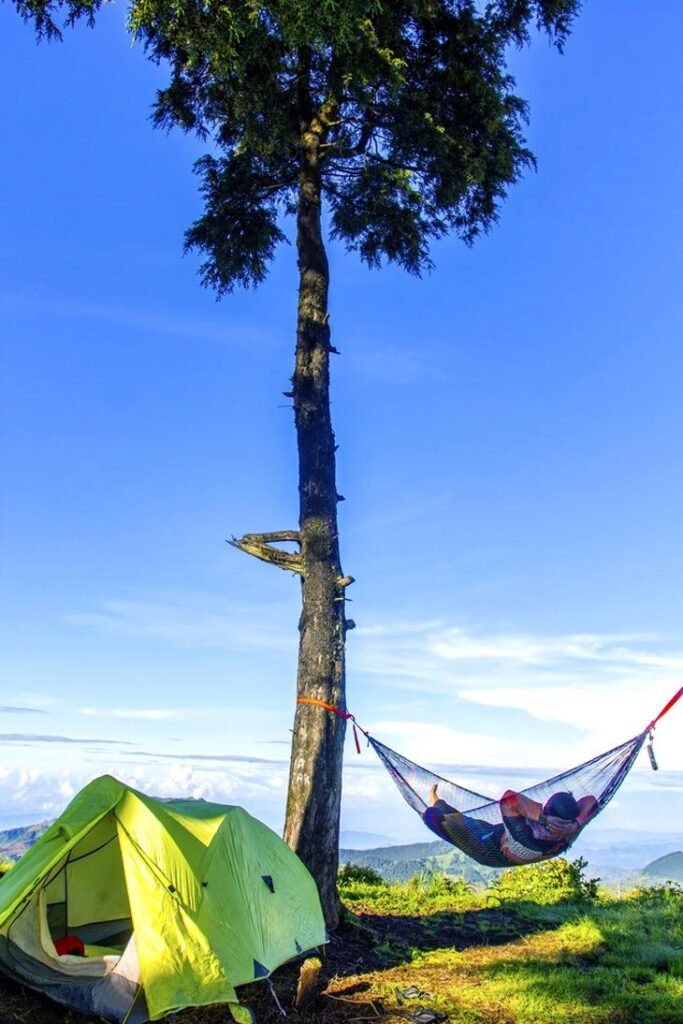You’ve always loved the great outdoors, right? Nothing beats leaving the desk behind and heading off into the wilderness for some time surrounded by nature. Camping has always meant a tent before but the hammock movement has really snowballed in recent years.
You’re considering making the switch to join the “hangers” but you don’t know enough about the hammock vs. tent debate. Do you think you want to try camping in a hammock? We provide a guide to both sides of the issue to help you make an informed decision.
Table of Contents
In Praise Of Swingers

Many hammock aficionados sing the praises of the wonderful night’s sleep a hammock allows you, something, they will say, a tent can never match.
We all know what it’s like to pitch a tent and curl up in our sleeping bag only to find that, despite our efforts to find the perfect spot, there’s huge root sticking in our back. This problem simply disappears when you’re suspended above the ground and sleeping soundly in a hammock.
Fans of hammocks will also speak of how easy it is to find a place to hang because you don’t need rock-free ground, and slopes pose no problems. As long as you can find two trees, you can pretty much sleep where you like.
This allows hammock users much greater freedom to roam as they are not restricted to designated campsites or areas suitable for pitching tents.
This leads to another claim made by supporters of the hammock movement: Hammocks are easier to set up. In its simplest form, all you need to do to get a hammock ready is to throw a couple of straps around a pair of trees and you’re ready to go. Of course, in reality you still need to set up the tarp, bug net and so on – but even then, it really is super easy.
Hammocks Are Good When:
- The ground is uneven or rocky
- You want to camp on a slope
- There is groundwater
- You want to sleep truly outside and under the stars
Why You Should Stay Grounded

One criticism levelled by detractors is that hammocks aren’t comfortable at all and that you end up being squished and twisted into unnatural angles by the shape.
In fact, different styles of hammock are available to help you with a more natural sleeping position so choosing the right kind of hammock for you could solve this issue.
Another negative, and one that might come as a surprise to some rookie hangers, is that hammocks are not necessarily the lighter option.
For sure, if you only take the hammock itself, the weight is almost negligible. But if you want to use a hammock in all but the very mildest conditions you will need to add a tarp (for example, a good choice would be Kelty Noah’s Tarp Shelter), an underquilt, a quilt to go on top and maybe even a second one in particularly cold conditions as well as a bug net if one isn’t integrated.
When you factor in all this extra gear, hammocks can end up being heavier than a tent configuration.
A further point we have just eluded to is the temperature. Tent sleepers lose heat through contact with the ground and need to be insulated to prevent this. In a hammock, however, you are exposed to any wind and you can lose even more heat this way. This means that the tarp and underquilt are vital and you won’t be able to save on weight by leaving them behind.
Tents Are Good When:
- There are no trees
- It’s cold or windy
- You want to share with somebody
- You want privacy
Horses For Courses

In general, both tents and hammocks have their advantages. If you’re camping somewhere with lots of rocks or on a slope, the advantages of a hammock are clear. The hammock will allow you to sleep in places where it would be impossible to pitch a tent.
However, to state the obvious, if you’re camping somewhere where it’s going to be hard to find suitable trees to hang your hammock, you have no choice but to opt for a tent.
Having weighed up the benefits of both tents and hammocks, in our view there is always going to be one that is more suitable for the location where you are hiking and this should guide your choice. Watch this video for more information:
Conclusion
While some hardcore converts swear they will never go back to tents having discovered the joys of hanging, there’s no reason to be so one-dimensional. In the same way you can have a glass of red with a steak but still enjoy a few beers in front of a football game, you can choose a tent or a hammock according to the conditions.
In answer to the Hammock vs. Tent debate, you don’t need to “make the switch” at all: hammocks and tents both have their advantages.
The smart hiker knows which one to adopt depending on the terrain and is skilled with both. Having said this, we fully recommend giving hammocks a go – as in the right conditions they really can revolutionise your wilderness experience.
What do you think? We’d love to hear your comment or questions below!
